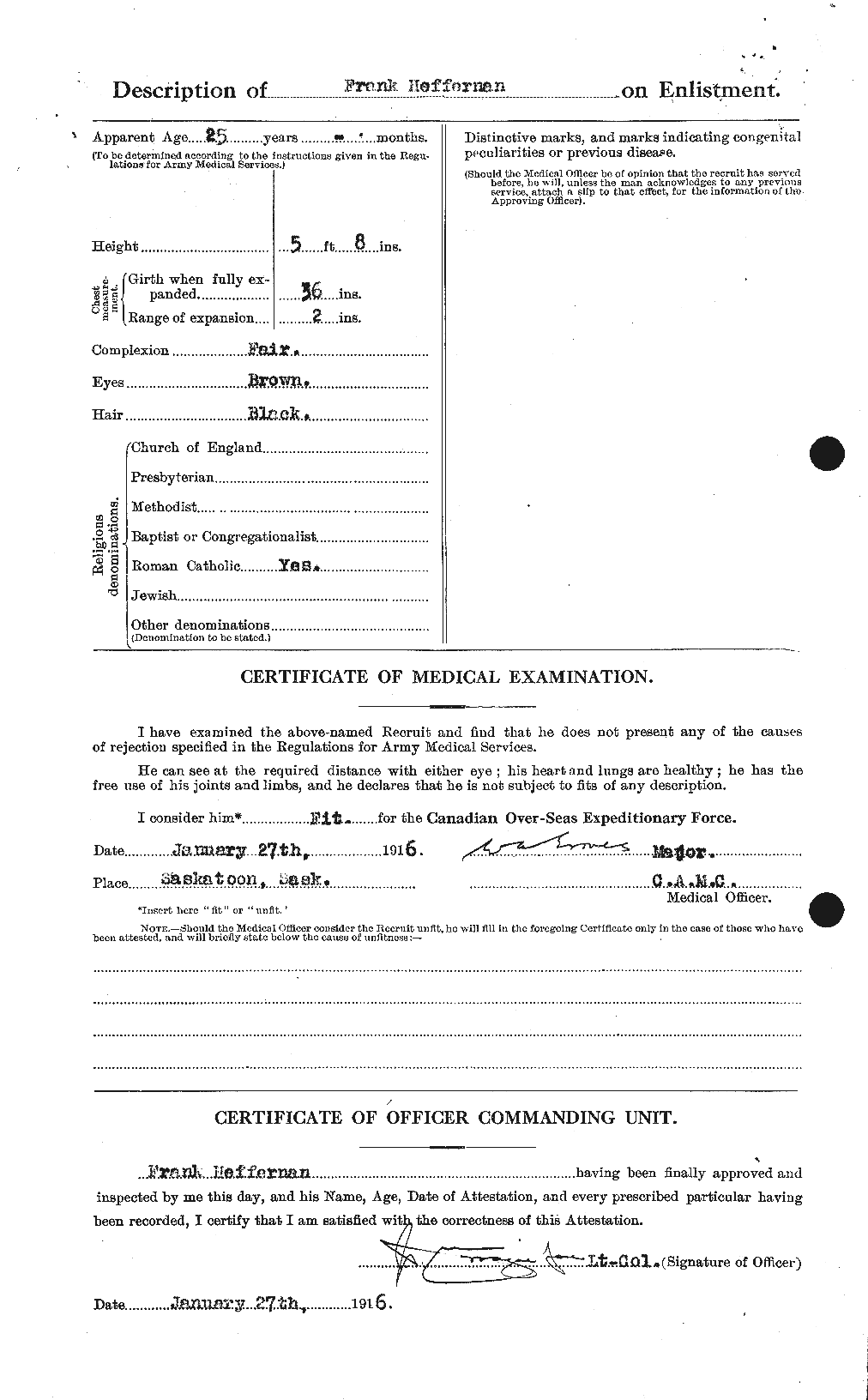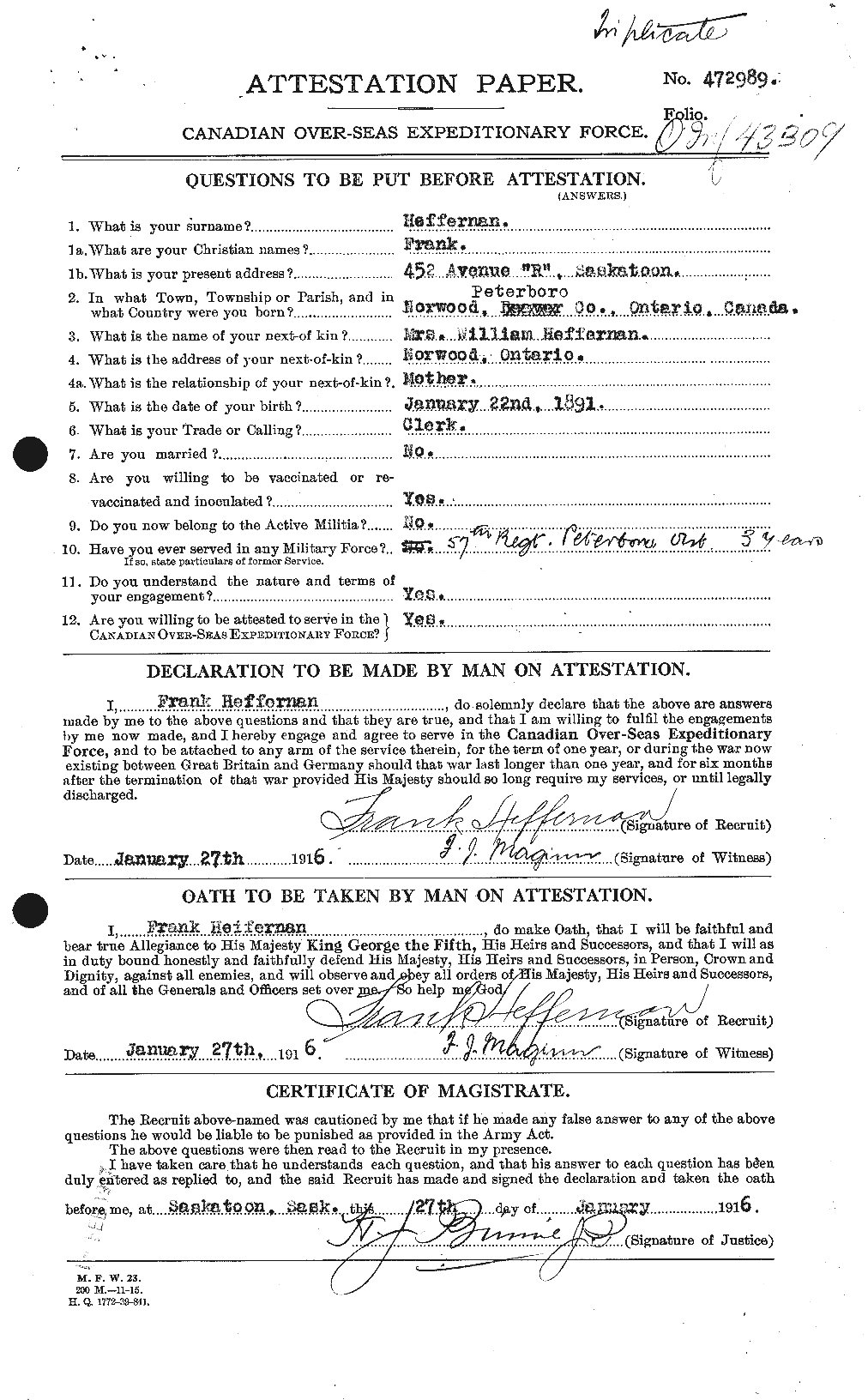
In Memory Of Frank Heffernan 1891-1917


Biography
Frank Heffernan was born on January 22nd 1891, an only child to father William Heffernan and mother Bridget Heffernan. He was born in Norwood, Ontario. After his father died, he moved to Saskatoon, Saskatchewan, to pursue a career as a clerk. He served for three years in the 57th regiment before the war began. On his 25th birthday (January 22nd 1916) Frank enlisted to join the efforts of the First World War in Saskatchewan. His regimental number became 472989. He named his mother as his next of kin and left all of his belongings to her in his last will and testament. On October 8th, 1916, Frank was officially put in combat in France as part of the 46th battalion. On November 11th, 1916, he was promoted from Private to Corporal. On March 30th, 1917, he was transferred to the 19th regiment. On September 28th, 1917, Frank Heffernan was killed in action at 27 years old in preparation for the battle of Cambrai. He is now buried as a Roman Catholic, in the Raillencourt Communal Cemetery Extension in Nord, France, plot 2 C 2. Frank Heffernan was the last of his family line, with no siblings or children.
These Letters where created by a student. They are not the actual letters that where sent furring the Great War.
Battle of Cambrai
The battle began in November, 1917. It was the first battle that tanks where truly effective, before this battle the British troupes where unsuccessful with maneuvering tanks effectively due to inexperience and harsh muddy conditions. When Byng ignored Fuller's initial plan of immodestly withdrawing the tanks, the allied forces were able to raid German lines initiating a huge breakthrough for the British allies. On November 20th 1917 the attack began. All available allied tanks were moved forwards along the 10 km front. This first day was incredibly successful for the allies but Byng failed to backup the surprise attack and it led to a loss of momentum and a large number of casualties in the days to follow. In the end, just over one-hundred thousand more men lost their lives but the land conquered in the first days of the battle led the British to another small victory on December 4th 1917.

Map of Rallencourt Communal Cemetery Extension, Nord, France. Frank Heffernan is berried in plot 2 C 2
Life Before the War
Before the Great War, Canada was booming. Jobs were becoming safer and more secure, technology was quickly growing, and the country as a whole was growing in size and population. Although Canada was legally its own country, the people and the government still looked to Britain for guidance and relied greatly upon their help in all ventures. The railroad was in it's final stages of completion and people could commute from one side of the country to the other.
Frank Heffernan took full advantage of all of the advancements and moved from Ontario to Saskatchewan to work as a clerk. He worked long hours and was paid unfairly. He lived alone and had little contact with his mother due to the expensive train ride that separated them. He sent letters to her often and did his best to keep in touch with her. Life was hard and he earned everything he had. Nothing was handed to him.
Moving Pictures
Movies were first made in the late 1890's and were becoming more and more popular during the First World War. Sound had not yet been introduced to the films and each motion picture usually only one or two minutes long, but some were as more than an hour in length. Although the films themselves weren't all that exciting, the concept of pictures that could move was new and thrilling. During the 1900's film was truly being discovered. Movie makers were experimenting with backdrops, camera angles, zoom, and moving the camera. It was common to see the same event occurring multiple times only at different angles. Movies typically cost five cents, giving this cinematic era the name of "The Nickelodeon Era". But it wasn't until after the war when Hollywood really rose and film became huge.
During the war the government would use the theaters as another propaganda outlet, like "the Battle of the Somme" (1916). Many films were made during the war including "The Man on the Box" (1914) and "The Little American" (1917) and "Hearts pf the World" (1918) which were released during this period. Charlie Chaplin films where quite popular. Film was used as a way to escape the burdens of regular life and be transported somewhere new and exciting. Everyone who could afford to went to the movies, because they could leave the war behind, if only for a few moments.



Arrival of a Train at La Ciotat
The Lumiere Brothers
1895
Just Rambling Along
Stan Lurel
1918
A Trip to the Moon
1902
Shoulder Arms
Charlie Chaplin
1918
Canadian Artillery in Action
Captain Kenneth Keith Forbes
46th battalion
The 46th battalion was authorized on November 7th 1914. It recruited all throughout south Saskatchewan and was mobilized in Moose Jaw, Saskatchewan. It was ran by Lt-Col H. Snell and Lt-Col H. J. Dawson. They where nicknamed the suicide battalion due to its 91.5% casualty rate. The battalion fought in many British and Canadian battles throughout the war including The Somme, Hill 70, Vimy, Passchendaele, The Battle of Cambrai, and The Battle of Scarpe. The battalion was disbanded on August 30th 1920.

46th battalion troups
Wawrw, Belgium
1918

Battle outline for the battle of Cambrai
November 23 1917






To Dead Soldiers
Emile Verhaeren
No more shall you see mountains, woods, earth,
Handsome eyes of my soldiers, just twenty years old,
Who fell last spring
When light was at its softest.
We dared not remember the golden fields
That dawn covered with iridescent glory;
Only the sadness of war was in our thoughts
When, behind the hamlets, came news of your death
Since your departure, at the angle of the mirror,
Your image attracted both heart and eyes;
No one sat on the rickety stool
Where each night, by the fireplace, you took your place.
Alas! Where are your young, strong and wild bodies?
Where are your arms, your hands and the superb gestures
You made with the big scythes in the fields?
Alas, the immense night has descended upon you.
Your mothers have wept in their closed thatched cottages,
Your lovers have spoken their sorrow to the villagers,
Every day you have been mentioned, sadly,
But, one evening in June, talk turned to something else.

Locomotive 166
1860




Frank Heffernan's Attestation Papers
46th Battalion
Saskatchewan
Battle of Cambrai
1917